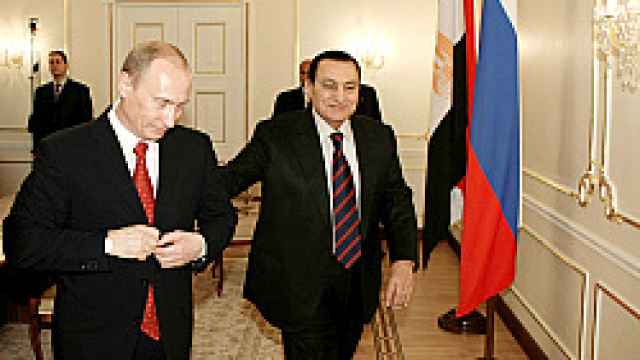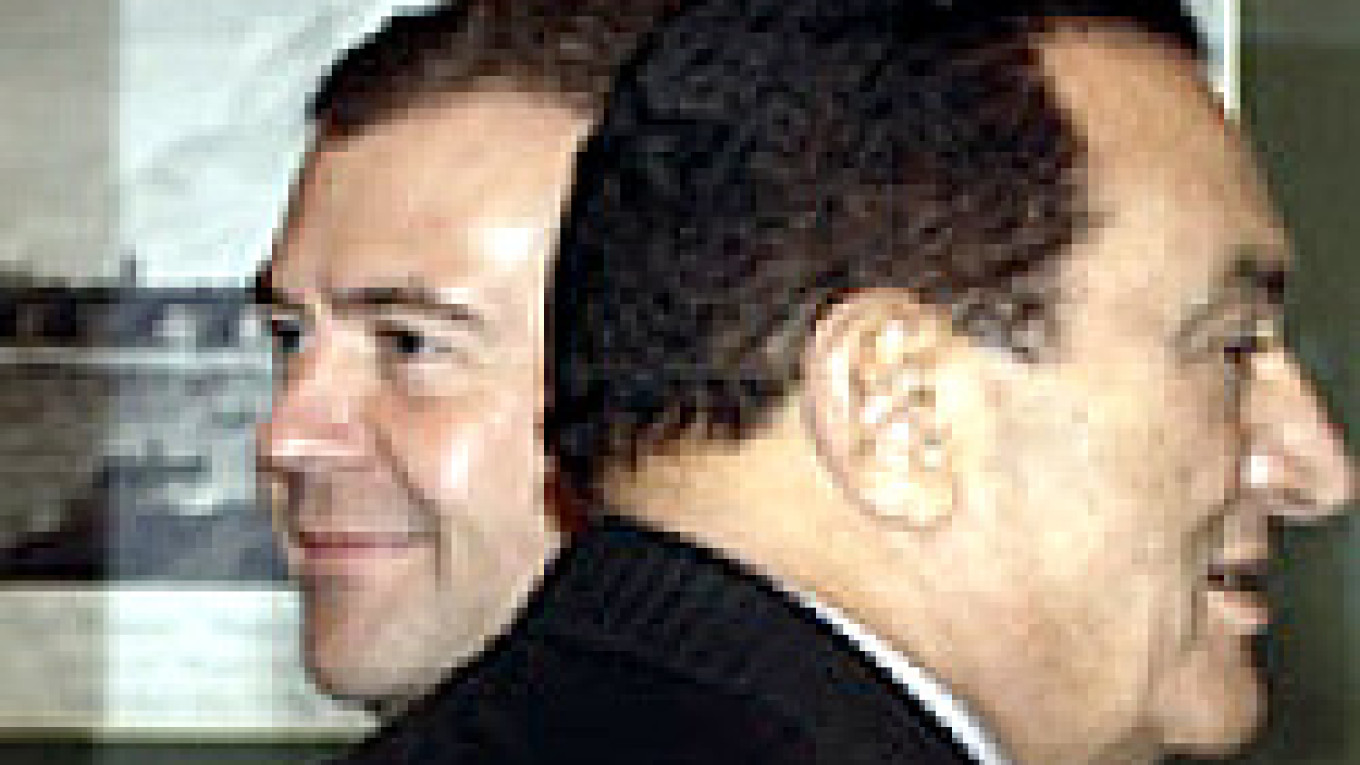The political faux pas cast a brief shadow over Mubarak's two-day visit, which wrapped up Tuesday with a widely expected agreement for Russian companies to bid for contracts to build nuclear power plants in Egypt.
At the start of talks with Putin at his residence outside Moscow, Mubarak said Putin strongly resembled Medvedev, the president-elect who will assume office in May.
"When I was heading into a meeting with Mr. Medvedev in the Kremlin and at the same time watched you on television, I was at a loss over who's who," Mubarak said.
"In this respect, there's little difference between you two," he said.
The smile vanished from Putin's face, and several reporters laughed. Medvedev is expected to closely follow Putin's lead as president.
But Putin took Mubarak's comment in stride, saying minutes later that even though he and Medvedev might look alike, Medvedev would certainly have "his own style."
The Kremlin's current policies will continue, Putin said, and cooperation with Medvedev will be easy because he is a key architect of the country's foreign policy.
Yevgeny Volk, head of the Moscow office of the Washington-based Heritage Foundation, said Mubarak's comparison was insensitive but would not hurt relations.
"It was a violation of protocol and all the norms of usual behavior," Volk said. But, he said, Russian officials would take into account Mubarak's age and cultural background. Mubarak, who studied at a Moscow military academy in the 1960s, is 79.
After about two hours of talks, Putin and Mubarak oversaw the signing of a framework agreement to jointly develop a peaceful nuclear program. Mubarak announced in Moscow in 2006 that Cairo was seeking Moscow's help in developing a nuclear energy market.
Egypt is keen to diversify its energy sources and wants four nuclear reactors in the near future. Russia is building nuclear power stations in Iran, India and China. The $800 million reactor in Bushehr has been of particular concern to Western governments wary of Iran's nuclear ambitions.
Rosatom, the federal atomic energy company, said Tuesday's agreement would allow Russians to bid for contracts to build nuclear power reactors.
 alexander zemlianichenko / ap Putin and Mubarak leaving a news conference Tuesday in Novo-Ogaryovo. | |
Putin, speaking at the start of the talks, promised that bilateral cooperation in the energy sector would be smooth and that Medvedev would see to that.
Some analysts have suggested that Russia wants Egypt to buy more weapons in return for nuclear assistance. Putin and Mubarak did not mention military cooperation in front of the reporters, but senior officials said on the sidelines of the news conference that arms sales had also been discussed.
"Everything was on the table," said Omar Suleiman, head of Egyptian intelligence, when asked whether the two presidents discussed deliveries of the Russian-made arms to Egypt.
"There is such an issue," said Mikhail Fradkov, head of the Foreign Intelligence Service and a former prime minister.
Both he and Suleiman declined further comment.
Defense analyst Ruslan Pukhov said it would be difficult for Russia to increase arms deliveries to Egypt, a market that has been dominated by the United States after ties between the Soviet Union and Egypt cooled in 1972.
"The infrastructure has been made to fit Western equipment," said Pukhov, director of the Center of Analysis of Strategies and Technologies.
Russia, however, could still offer the Egyptians air defense weapons that the United States "either couldn't or didn't want to sell," he said.
Putin and Mubarak also discussed Russia's interest in holding a Middle East peace conference in Moscow.
Russia, a member of the Quartet of Middle East mediators with the United States, United Nations and European Union, is keen to boost its status as a Middle East power broker.
The Moscow conference would be seen a follow-up to a U.S.-hosted meeting in Annapolis late last year.
Putin said that, even though the conference would be hosted by Russia, he wanted all the sides to be involved in its preparation.
"If this conference takes place, we want it to be a Moscow conference in name only," Putin said. "We are not going to impose anything on anybody [and] lead."
At the same time, he added, the meeting would be an event in its own right.
Both he and Mubarak expressed concern over growing tensions in the Palestinian territories and called for a stop to violence.
Mubarak said Russian-Egyptian relations have blossomed during Putin's eight years in office and invited Medvedev to visit Egypt.
A Message from The Moscow Times:
Dear readers,
We are facing unprecedented challenges. Russia's Prosecutor General's Office has designated The Moscow Times as an "undesirable" organization, criminalizing our work and putting our staff at risk of prosecution. This follows our earlier unjust labeling as a "foreign agent."
These actions are direct attempts to silence independent journalism in Russia. The authorities claim our work "discredits the decisions of the Russian leadership." We see things differently: we strive to provide accurate, unbiased reporting on Russia.
We, the journalists of The Moscow Times, refuse to be silenced. But to continue our work, we need your help.
Your support, no matter how small, makes a world of difference. If you can, please support us monthly starting from just $2. It's quick to set up, and every contribution makes a significant impact.
By supporting The Moscow Times, you're defending open, independent journalism in the face of repression. Thank you for standing with us.
Remind me later.


